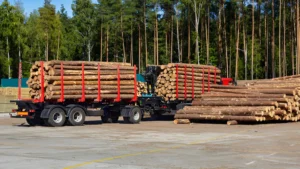How Much Money Do Loggers Make?
- September 9, 2024
- 0 comment
Logging is a critical industry in many parts of the world, responsible for providing the raw materials needed for construction, furniture, paper products, and much more. Despite its importance, the income of loggers can vary significantly based on various factors like experience, location, the type of logging work, and union affiliation.

For those considering a career in logging or simply curious about how much loggers earn, there are multiple layers to explore. This article dives deep into the subject, discussing how much money loggers make and what factors influence their salaries.
Types of Logging Jobs
The logging industry is diverse, and not every logging job is the same. There are multiple roles within the sector, each with different responsibilities and corresponding pay scales. Some of the key positions in the logging industry include:
- Fallers: These workers are responsible for cutting down trees using chainsaws or felling machines. The skill required to fell a tree safely and efficiently commands higher pay, especially for experienced fallers.
- Bucking Operators: After the tree has been felled, buckers cut the tree into manageable pieces, ensuring the timber meets specific size requirements. This role requires attention to detail, and while it may not be as dangerous as felling, it is still critical to the logging process.
- Skidder Operators: Skidders drag felled trees out of the forest to a landing area where they can be loaded onto trucks. These operators handle heavy machinery, and their pay reflects the skill and experience needed to operate large logging equipment safely.
- Logging Equipment Operators: These professionals handle other machinery such as loaders, delimbers, and forwarders, contributing to various stages of processing timber. Equipment operators typically receive wages higher than manual laborers due to the complexity of their work.
Because logging involves both manual labor and machine operation, salaries can vary greatly depending on the role.
Regional Differences in Logging Salaries
Location is a significant factor when determining how much money loggers make. In the United States, the Pacific Northwest and the Southeast are major logging hubs, with higher-than-average wages. States like Oregon, Washington, and California, where timber is a key industry, often offer higher wages due to the high demand for logging.
Internationally, logging wages can vary depending on the region. In countries like Canada, where logging is a significant part of the economy, loggers can earn competitive salaries, especially in provinces like British Columbia. In contrast, countries with less developed timber industries might pay lower wages.
The average wage for a logger in the United States is around $45,160 annually, according to the U.S. Bureau of Labor Statistics (BLS). However, in high-demand regions or states with a strong timber industry, this figure can rise significantly.
Entry-Level Logging Salaries
For those just entering the logging industry, salaries tend to be lower as workers gain experience and develop the necessary skills. Entry-level loggers, particularly those working in manual labor positions or operating basic equipment, can expect to earn between $30,000 and $35,000 annually. While this may seem modest, logging is one of the few industries where formal education is not required, and workers can often gain on-the-job training.
New hires in regions with a strong timber industry might start at higher rates, especially if they are unionized or working for large companies with better compensation packages.
Experienced Loggers’ Earnings
With experience comes increased earning potential in the logging industry. As loggers gain years of experience, their skills improve, allowing them to take on more specialized and higher-paying roles. Fallers, for instance, can earn significantly more as they become proficient at cutting trees safely and quickly. Skidder operators and equipment operators can also see their salaries increase as they take on more responsibility.
| Experience Level | Average Annual Salary | Salary Range |
|---|---|---|
| 5–10 Years Experience | $50,000 | $45,000 – $60,000 |
| 10–15 Years Experience | $55,000 | $50,000 – $65,000 |
| 15+ Years Experience | $60,000 | $55,000 – $70,000+ |
Typically, experienced loggers can earn between $50,000 and $60,000 per year, with some making even more, depending on their role and location. Skilled equipment operators in high-demand regions or those working for major timber companies may see salaries reach the $70,000 mark.
Logging Wages vs. Other Forest Industry Jobs
While loggers earn respectable wages, it’s helpful to compare their earnings with other positions in the forestry industry. Forest managers, who oversee logging operations, tend to earn more, with annual salaries ranging from $60,000 to $80,000. Mill workers, who process timber after it’s been logged, may earn slightly less than loggers, with pay typically between $30,000 and $45,000 annually.
| Job Role | Average Annual Salary | Salary Range |
|---|---|---|
| Loggers (General) | $45,160 | $30,000 – $60,000 |
| Experienced Loggers | $55,000 | $50,000 – $70,000 |
| Forest Managers | $70,000 | $60,000 – $80,000 |
| Mill Workers | $38,000 | $30,000 – $45,000 |
| Arborists | $50,000 | $40,000 – $60,000 |
| Self-Employed Loggers | $70,000 | $40,000 – $100,000+ |
Arborists, who specialize in the care of individual trees rather than mass logging operations, can earn salaries similar to experienced loggers, particularly if they are certified or have specialized training.
Impact of Education and Certifications
Unlike many industries, logging does not require a formal degree. However, vocational training and certifications can boost a logger’s earning potential. For instance, certification in operating specific logging equipment can lead to higher-paying roles, especially in larger operations that use more advanced machinery.
Safety certifications are also valued in the industry, as logging is one of the most dangerous jobs. Certified loggers with safety training often earn more, reflecting their ability to work in high-risk environments while minimizing accidents.
Self-Employed Loggers
For those who prefer independence, working as a self-employed logging contractor is an option. Self-employed loggers typically have the potential to earn more than salaried employees, but their income is dependent on securing contracts and the ability to manage the costs of equipment, fuel, and insurance.
The income of independent loggers can vary widely, from as low as $40,000 to over $100,000 annually, depending on the size of their operations and the number of contracts they can secure. The risk of being self-employed is balanced by the potential for higher profits.
Overtime and Seasonal Work
Loggers often work long hours, especially during peak seasons when the demand for timber is high. Overtime pay can significantly boost a logger’s annual income, particularly in unionized settings where overtime rates are well-regulated.

Many logging operations are seasonal, with higher pay offered during busy periods. This can result in a varied income, where loggers earn much more during certain months but might experience slow periods during off-seasons. Planning for these fluctuations is important for managing annual earnings.
Union vs. Non-Union Logging Jobs
Unionized logging jobs tend to offer higher wages, better benefits, and more job security than non-union positions. Unions negotiate for better compensation packages, which can include health insurance, retirement benefits, and regulated overtime pay. In contrast, non-union loggers might not have the same level of job protection or benefits, although they could have more flexibility in terms of work schedules and contracts.
Final Conclusion
The salary of a logger varies widely based on experience, location, job role, and whether they are unionized or self-employed. While starting wages might seem modest, the potential to earn a good income increases with experience, especially for those who specialize in equipment operation or manage their own logging business. For those willing to work in high-demand regions or take on more hazardous roles, the financial rewards can be substantial.
Frequently Asked Questions (FAQs)
- What is the average salary of a logger in the United States?
The average salary of a logger in the United States is around $45,160 per year, according to the U.S. Bureau of Labor Statistics (BLS). However, this figure can vary based on experience, location, and job role. - Do loggers need formal education to earn a higher salary?
No, formal education is not typically required to become a logger. However, vocational training, safety certifications, and expertise in operating logging equipment can increase earning potential. - Which U.S. regions offer the highest salaries for loggers?
Loggers in states like Oregon, Washington, and California often earn higher wages due to the large demand for timber in these regions. The Pacific Northwest is known for offering some of the best salaries in the industry. - How much do entry-level loggers make?
Entry-level loggers typically earn between $30,000 and $35,000 annually, depending on the region and the specific job role. This salary increases as they gain experience and skills. - How much can an experienced logger expect to earn?
Experienced loggers with specialized skills can earn between $50,000 and $60,000 per year, with some making more depending on their job role and the demand in their region. - Do self-employed loggers make more money than salaried workers?
Self-employed loggers have the potential to earn more than salaried workers, but their income depends on securing contracts and managing operational costs. Earnings can range from $40,000 to over $100,000 annually, depending on the size of their operation. - How do unionized logging jobs compare to non-union positions in terms of salary?
Unionized logging jobs often come with higher wages, better benefits, and more job security compared to non-union positions. Unions negotiate for higher pay, regulated overtime, and additional perks such as health insurance and retirement plans. - Are there seasonal fluctuations in logger salaries?
Yes, many logging operations are seasonal, meaning that loggers may earn more during peak periods when the demand for timber is higher. Overtime pay during busy seasons can also significantly boost annual income. - How does the danger of the logging profession affect wages?
Due to the hazardous nature of the job, loggers often receive hazard pay or higher salaries, particularly for positions that involve more risk, such as fallers or equipment operators working in challenging environments. - What other benefits do loggers receive beyond salary?
In addition to wages, many loggers receive benefits such as health insurance, retirement plans, paid time off, and overtime pay. Unionized positions often offer more comprehensive benefit packages compared to non-union jobs.
We hope this guide has provided valuable insights into how much money loggers make and the factors that influence their earnings. Have personal experiences working in the logging industry or ideas on how to improve conditions for loggers? Share your thoughts and join the conversation below. Your input can help others understand the complexities of this profession and support sustainable practices in the forestry sector. Don’t forget to share this guide with those interested in logging careers or who want to learn more about the industry’s financial aspects.

James Wilson
Forestry AuthorJames Wilson has over 15 years of experience in forestry economics, specializing in sustainable practices, investment opportunities, and financial management. He has contributed to notable publications like "Forestry Today" and "EcoFinance Journal" and is known for providing practical and insightful advice. With a degree in Environmental Economics, James stays updated through continuous learning and active participation in industry discussions. Outside work, he enjoys hiking and nature photography, bringing a well-rounded perspective to his professional role.













Leave your comment